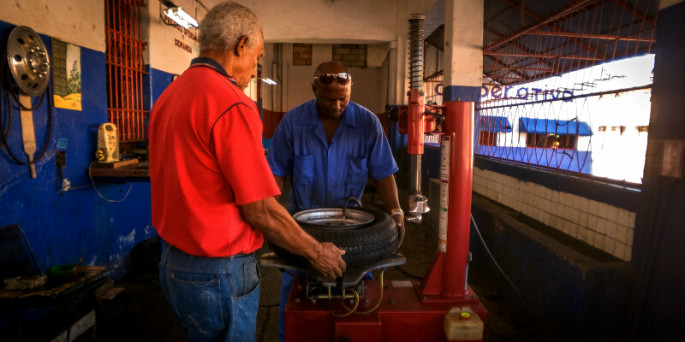
The damned labor unions
HAVANA — What are labor unions useful for in a country with a socialist design? The question becomes increasingly important now that types of ownership other than state property coexist again in Cuba.
Do labor unions belong in non-farm (urban) cooperatives, known as CNAs, or in private businesses? Accursed by the bureaucracy and their lack of autonomy, labor unions long ago veered from their original course.
Marcela is black and robust. For that reason — not because she’s a bad bartender — she was disqualified from working in a private bar. Sonia was rejected right after the owner of a new restaurant asked her: “Do you have any small children?” That would complicate matters for the restaurant if the child got sick. And nobody knows how to protect Mario, who takes care of his elderly parents.
The 17 national labor unions that constitute the Cuban Workers Central (CTC) translate into 3.2 million members, out of 4,918,800 workers in the country. Of the more than 426,000 workers licensed as self-employed, as recorded by the National Statistics Office in 2014, 62 percent are union members, according to NSO officials.
“On this topic, we’re collecting experiences and drawing up our own proposals,” said Raymundo Navarro, member of the CTC’s National Secretariat.
What no functionary has said is what exactly those proposals are, or what does it mean for self-employed workers to belong to a labor union, other than having to pay monthly dues that are not accounted for publicly.
Sonia, who holds a license as a self-employed worker and is a member of a CNA, had to go to her municipality’s labor union to sign up. In exchange, she received a letter from the union that allows her to place her son in a state-run daycare center — free of charge, as are all the educational services provided by the state. But that’s the only benefit that she receives as a worker.
The labor union at the Revolution Square municipality has not challenged the management of any private business or CNA for discriminating against Sonia in her condition as a mother.
Private Ownership
The socio-political context in Cuba has been rewriting the role of the labor unions. There is a de-facto assumption that labor rights are guaranteed. But some research of a sociological nature reveals relations of “power without equity” in a scenario (self-employment) with an excess of demand, which restricts the possibilities of defense for the hired workers, because the waiting list of people who want to take their jobs is long.
Manual labor is not cheap, it’s almost always professional and there’s plenty around.
In the compendium “A Look at the Cuban Economy: Between Economic Efficiency and Social Equity,” professor and economist Omar Everleny estimates that a self-employed worker earns approximately three times the monthly salary of a state-employed worker. That difference is reflected not only in the remuneration but also in the abusive labor conditions.
The existence of capitalist private property in Cuba since 1959 is not unheard of, but it is increasingly less rare and more visible. Last January, researcher Luis Marcelo Yera analyzed that topic at the Juan Marinello Research Institute, during a workshop on socio-cultural anthropology.
According to the workshop, private owners can mean small farmers, usufruct farmers, some artisans and workers involved in foreign investment — basically anyone with salaried workers.
Between the party that pays and the party that collects (capital and labor) there is a genetic contradiction. In the state sector, this is not so evident, but in the self-employed sector many now understand that they’re totally without shelter. Could it be that self-employed employees need a new labor union?
Conversely, at the CNAs it’s still not clear if — in practice — the presence of a labor union is necessary, whether it includes cooperative members of self-employed workers.
The non-farm (urban) cooperative
Alfonso Larrea, commercial director for the CNA Scenius, has tackled this issue in the past.
“There is an immediate response to the physical, real and tangible presence of the labor union in cooperatives and it’s ‘NO.’ We have not seen it appear in any of the phases of formation of any cooperative. Only when it comes to collecting dues,” Larrea says.
He speaks with the authority of someone who has worked with almost 200 cooperatives and is willing to debate anyone on the subject.
Law No. 116, Article 12 of the Labor Code defines a labor union as an organization formed by workers. From a legal perspective, the first issue would be to make clear if CNA members are recognized as such, because the legal-labor relationship in these forms of economic management is still being “handled with tweezers” — at arms’ length.
In his article “Non-Farm Cooperatives in Cuba: A Critical Analysis of the Legal Regulations for their Formation and Operation,” lawyer Jorge Luis González Castro describes this disjunctive: while the Labor Code does not consider union members as salaried workers, the CNA regulations say that the members are obligated to participate with their labor, independently from any other contribution (money, real estate, etc.)
In other words, they are not salaried workers but have to work in order to be entitled to the earnings. And, as a cooperative, they are considered to be entities, vis-à-vis the hired workers.
According to Larrea, to demand from the members a direct involvement with the production and the services avoids the existence of exclusive figures “such as the financier-member who contributes capital.” From this perspective, the members are totally unprotected, even though they work.
The unions have no effective action over the members or the hired workers, because the latter can be associated with the cooperative for only three months, tops.
Another point on which Larrea insists is that, during the process of negotiation in the induced cooperatives, the applicants to membership (until they constitute legally) continue to be workers for the entity, “for which reason, it is justifiable and advisable for the union to accompany them in the process and demand that they prove their capabilities.”
That’s the moment when a group of workers needs to negotiate directly with management.
So what are our damned labor unions useful for? For a lot. Except that they need to rise from their ashes. There’s work to be done.



